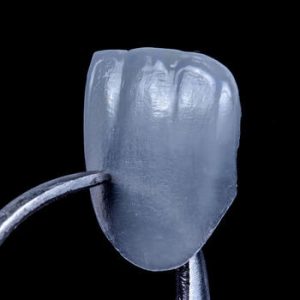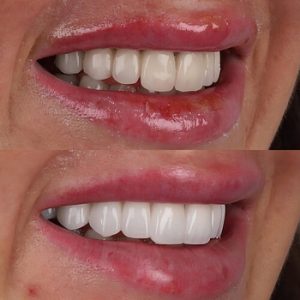Dental veneers have gained immense popularity in cosmetic dentistry, becoming a go-to solution for individuals seeking to enhance their smiles. It is essential to understand what happens when you get veneers, including the types available, how they compare to other treatments, and how to care for them effectively.
This guide will provide all the information about veneers, ensuring you feel confident and excited about your decision.
Understanding Veneers
Veneers are thin shells meant to cover the front surface of your teeth, creating a natural-looking smile. They can effectively address various cosmetic concerns, such as discoloured, misshapen, chipped, or broken teeth. Veneers are custom-made and attached to your natural teeth, providing a permanent solution for enhancing your appearance.
Types Of Veneers
Porcelain and composite veneers are the two main types of veneers available to improve your smile.
You can select the dental veneer type that best suits your cosmetic objectives and dental requirements by taking into account its unique qualities, benefits, and drawbacks.
Porcelain Dental Veneers
 Traditional porcelain veneers are crafted from high-quality ceramic material that closely resembles natural tooth enamel.
Traditional porcelain veneers are crafted from high-quality ceramic material that closely resembles natural tooth enamel.
Known for their durability and stain resistance, they are an excellent choice for those seeking a long-lasting cosmetic solution.
- Longevity: With proper care, porcelain veneers can last more than a decade, making them a durable investment in your smile.
- Natural Aesthetic: The translucent quality of porcelain mirrors the appearance of natural teeth, leading to a seamless look.
- Stain Resistance: Unlike natural teeth, porcelain is less susceptible to staining, helping to maintain a bright and vibrant smile.
Composite Resin Veneers
The substance used to create composite resin veneers is a tooth-coloured composite that can be carefully sculpted and polished to resemble your teeth’s natural appearance.
They serve as a more affordable substitute for porcelain veneers.
- Affordability: Composite veneers are typically more cost-effective than their porcelain counterparts, making them accessible for many individuals.
- Quick Application: The procedure for applying composite veneers may often be completed in a single appointment, offering convenience for those with busy schedules.
- Easy Repairs: If composite veneers chip or sustain damage, they can be repaired more easily than porcelain veneers, ensuring your smile remains intact.
Temporary Dental Veneers
When creating your permanent veneers, your dentist might suggest getting temporary ones. These provide a short-term solution to maintain the appearance of your smile, allowing you to feel confident as you await your final restoration.
By understanding these different types of veneers, you can make the choice that suits your aesthetic goals and dental health needs.
What Happens When You Get Veneers: The Procedure
Understanding the process of getting veneers can help alleviate any concerns you may have. This is a detailed explanation of what to anticipate while applying veneers.
Initial Consultation
Your process begins with an initial appointment with a cosmetic dentist, where your specific dental needs and treatment goals will be discussed.
During this visit, your dental expert will thoroughly evaluate your teeth, gums, and oral health to spot any issues that may need addressing.
Together, you will explore the types of veneers available, considering factors such as aesthetics, durability, and cost to determine the best option for your situation.
Based on this discussion, a personalised treatment plan will be created, outlining the necessary steps and any preparatory work required before applying your veneers.
Preparing Your Teeth
Once you and your dentist have agreed on the treatment plan, the next phase involves preparing your teeth for the veneers.
In this step, a thin layer of tooth enamel will be shaved down from the front surfaces of the teeth receiving veneers.
This reduction is crucial for ensuring the veneers fit comfortably and look natural. Your dental expert will then take impressions of your teeth to create custom-made veneers that perfectly fit your mouth. These impressions ensure your new veneers align with your natural bite and smile.
If necessary, temporary veneers may be placed on your teeth to safeguard them while your permanent dental veneers are being made in a dental laboratory. These temporary solutions help maintain the appearance of your smile during the waiting period.
Fitting The Veneers
Once your custom veneers are ready, you’ll return to the dentist’s office for the fitting appointment. Your dentist will first try on the veneers to check their fit and ensure they match the colour of your natural teeth. This is an important step in achieving the desired aesthetic result.
If any adjustments are needed, your dentist will reshape the veneers or alter their colour to ensure the best match with your existing teeth. After achieving the perfect fit, the dental cement bonds the veneers to your natural teeth.
This involves applying a particular adhesive and curing it with a light to ensure a strong, lasting hold. The veneers are secured in place, and this procedure provides a permanent solution for enhancing your smile.
Final Touches
After the veneers are securely bonded, your dentist will make final modifications to ensure everything looks and feels right.
This includes carefully removing any excess dental cement to create a smooth finish, ensuring your new veneers blend seamlessly with your natural teeth.
Finally, the veneers will be polished to enhance their shine, giving you a radiant, beautiful smile that you can proudly show off.
Veneers Vs. Other Types Of Treatment
While veneers offer numerous benefits for enhancing the appearance of your smile, it’s essential to understand how they differ from other cosmetic dental treatments.
Each option has its own strengths and applications, catering to various dental concerns and patient preferences.
Veneers Vs. Dental Crowns
 Dental crowns are custom-made caps that fit over a tooth to reclaim its shape, size, and strength.
Dental crowns are custom-made caps that fit over a tooth to reclaim its shape, size, and strength.
Unlike veneers, which only cover the tooth’s front surface, crowns are typically used when more extensive restoration is needed, such as for severely damaged or weakened teeth.
Veneers are particularly effective for cosmetic enhancements, making them an excellent choice for individuals looking to enhance the appearance of discoloured, chipped, or misshapen teeth.
In contrast, crowns are better suited for teeth that have undergone significant decay or trauma and require additional support.
Furthermore, the process of placing a dental crown often involves more extensive removal of natural tooth structure than a porcelain veneer, making the latter a more conservative option for safeguarding natural teeth.
Veneers Vs. Orthodontic Treatment
Orthodontic treatments, such as metal braces and clear aligners, focus primarily on correcting the alignment of misaligned or crooked teeth.
While these treatments can greatly improve your dental alignment, they do not directly enhance the appearance of the teeth in the same way that veneers do.
One key difference is the overall duration of treatment. Orthodontic processes can take months or even years to achieve the desired results, whereas veneers provide immediate cosmetic enhancement, allowing you to enjoy a transformed smile right after the procedure.
In some cases, patients may combine orthodontic treatment with veneers to achieve the best overall results, simultaneously addressing alignment and aesthetic concerns.
Veneers Vs. Teeth Whitening
Teeth whitening treatments are meant to lighten the colour of your natural teeth, making them appear brighter and more vibrant. However, whitening treatments may not resolve other cosmetic issues such as chips, cracks, or misshapen teeth.
Veneers excel in this area, as they not only enhance the colour of your teeth but can also effectively cover and restore those with cosmetic flaws. This makes them a more versatile option for individuals seeking a complete smile makeover.
Additionally, porcelain veneers are stain-resistant, providing long-lasting results compared to teeth whitening treatments, which often require ongoing sessions to maintain brightness over time.
By understanding these comparisons, you can decide whether veneers are a good choice for your cosmetic dental needs, ensuring you achieve the smile you’ve always wanted.
How To Take Care Of Your Veneers
Proper care for your veneers is essential to maintaining their appearance and longevity. By following a few key practices, you can keep your veneers looking their best and ensure your smile remains radiant.
Maintain Good Oral Hygiene
The foundation of excellent dental health is consistent oral cleanliness. It’s important to brush your teeth and veneers twice a day with fluoride toothpaste and a soft-bristled toothbrush.
Additionally, floss daily to prevent plaque buildup around the veneers and promote healthy gums. Regular oral hygiene helps maintain the integrity of your veneers and contributes to your overall dental health.
Be Mindful Of Your Diet
Being mindful of your diet is another important factor in preserving the quality of your veneers. Avoid chewing hard foods or ice, and refrain from using your teeth as tools, as these habits can potentially damage your veneers.
While porcelain veneers are known for their stain resistance, limiting your consumption of dark-coloured foods and beverages, like coffee, tea, or red wine, will eventually lead to discolouration. By being cautious with your diet, you can help maintain the vibrant appearance of your smile.
Regular Dental Check-Ups
Frequent dental examinations are essential to the continued health of your veneers. Remember to make follow-up visits with your dentist so they may perform examinations and professional cleanings.
Your dentist will check on the veneers’ condition and answer any questions you may have throughout these sessions.
If you notice any issues, such as discolouration or damage, don’t hesitate to consult your dentist promptly for a thorough evaluation. These check-ups not only help maintain your veneers but also keep your entire oral health in check.
Consider A Mouthguard
If you grind your teeth at night or engage in contact sports, it may be beneficial to consider wearing a mouth guard. This protective gear can help safeguard your veneers from potential damage, ensuring they remain in excellent condition for years to come.
Protecting your investment in your smile is essential, and a mouthguard can provide that extra layer of security against accidental damage.
Frequently Asked Questions
Can I whiten my teeth if I have veneers?
Whitening treatments may not affect the colour of your veneers, so it’s advisable to consult your dentist for recommendations on maintaining a bright smile that includes both your natural teeth and veneers.
Can I choose the colour of my veneers?
Yes, one of the advantages of veneers is the ability to choose their colour. During your consultation, your dentist will discuss the shade that matches your natural teeth or achieves your desired aesthetic. The goal is to create a seamless and natural appearance for your smile.
Do veneers damage natural teeth?
When applied correctly by a qualified cosmetic dentist, veneers should not damage your natural teeth. Proper care and regular dental visits are essential to maintaining oral health.
Can veneers change my bite or the way my teeth fit together?
When properly fitted by a skilled dentist, veneers should not change your bite or the way your teeth fit together. Your dentist will ensure your new veneers align properly with your teeth. If you experience any discomfort after the procedure, it’s essential to contact your dentist for adjustments.
Can I use whitening toothpaste with veneers?
It’s generally not recommended to use whitening toothpaste on veneers. While porcelain veneers are stain-resistant, whitening products may not be effective and could cause wear over time. Instead, maintain your veneers with regular brushing using non-whitening fluoride toothpaste.
Can veneers be removed?
Veneers can be removed, but the process is not straightforward. Because they are bonded to your natural teeth, removal typically requires the expertise of a dentist. Additionally, the removal process may compromise the underlying tooth structure, so discussing this option with your dentist if needed is essential.
What if I don’t like the appearance of my veneers?
If you’re not satisfied with the appearance of your veneers, communicate your concerns to your dentist. Depending on the issue, they may be able to make adjustments or even replace the veneers to better meet your aesthetic goals. Open communication is key to achieving a smile you love.
What should I do if my veneers chip or become damaged?
If your veneers chip or sustain damage, contact your dentist promptly. Depending on the extent of the damage, your dentist may be able to repair composite resin veneers more easily than porcelain veneers. In some cases, a new veneer may need to be created to restore your smile.
Achieving A Radiant Smile: Final Thoughts On Veneers
 Getting veneers can be an exciting journey towards achieving a beautiful, confident smile. Understanding what happens when you get veneers, including the types available, how they compare to other treatments, and proper care techniques, empowers you to make informed decisions about your dental health.
Getting veneers can be an exciting journey towards achieving a beautiful, confident smile. Understanding what happens when you get veneers, including the types available, how they compare to other treatments, and proper care techniques, empowers you to make informed decisions about your dental health.
With their ability to enhance your smile and address cosmetic flaws, veneers have become a preferred choice for many individuals seeking a radiant, natural-looking appearance.
If you’re considering veneers, consult a qualified cosmetic dentist who can guide you through the process and help you achieve the smile of your dreams.
If you’re excited about the prospect of enhancing your smile with veneers, we’re here in Castle Hill to help! Our experienced cosmetic dentists will guide you through every step of the process, ensuring you achieve the smile of your dreams.
Contact Beyond Infinity Dental today at (02) 8806 3799 to book your appointment. Let’s embark on this journey together towards a brighter, more confident you!
Sources
Healthdirect Australia. Veneers [Internet]. Healthdirect. 2023 [cited 2024 Oct 3]. Available from: https://www.healthdirect.gov.au/veneers
Manolis A. 4 Types of Veneers [Internet]. NewMouth. 2024 [cited 2024 Oct 3]. Available from: https://www.newmouth.com/dentistry/cosmetic/veneers/types/
Sahi A. Dental Veneers: Procedure and Safety [Internet]. News Medical. 2023 [cited 2024 Oct 3]. Available from: https://www.news-medical.net/health/Dental-Veneers-Procedure-and-Safety.aspx
Baluch A. How Long Do Veneers Last? What to Expect [Internet]. Forbes Health. 2024 [cited 2024 Oct 3]. Available from: https://www.forbes.com/health/dental/how-long-do-veneers-last/
Chirichella C. Veneers Vs. Crowns: What Are the Differences? [Internet]. Verywell Health. 2024 [cited 2024 Oct 3]. Available from: https://www.verywellhealth.com/veneers-vs-crowns-5214997
Editorial Team. 5 Tips on Taking Care of Your Veneers [Internet]. Meds News – Health And Medicine Information. 2023 [cited 2024 Oct 3]. Available from: https://www.medsnews.com/health/5-tips-on-taking-care-of-your-veneers/









